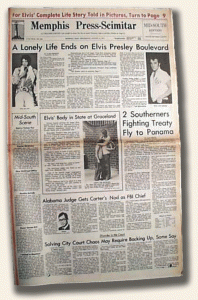My collecting story… M.R. in Singapore…
May 8, 2020 by GuyHeilenman · Leave a Comment
Below we continue our series in which we post the “stories” graciously submitted by our collecting friends during the pandemic of 2020.
My fascination with antiquity generally and old publications specifically began when I was a young child, although I clearly didn’t have the means to acquire them way back then. I have always been fascinated with history, and thus old publications (newspapers, magazines and books) accord one a precious opportunity to come face-to-face with the very publications people read contemporaneous to the events of the period, be they revolutions, a civil war, a presidential inauguration or assassination, or a whole host of other events of historical import. There is even a ‘tactile sensation’ that gives much pleasure in knowing that you are actually leafing through pages originally perused by others up to 300 or even 400 years back! In the case of newspapers in particular, there is also that intellectual joy of reading what are basically primary historical sources, thereby relishing the very
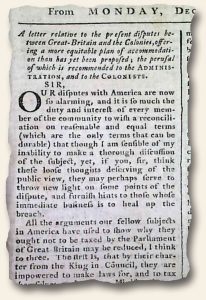
‘flavour’ of the reports of the times and the sometimes strong or biased opinions put forth by editors or letters published from readers.
It is exceedingly difficult to identify the one publication that I would value the most, over any other. In my case it is a tie between two very different historical periods: the 1760s and 1770s, in which one finds myriad accounts of the events leading up to the American Revolution; and the newspapers of April 1865, which came out in the wake of the assassination of one of America’s greatest presidents, Abraham Lincoln. What makes the former category especially interesting in both British and American papers is the fact that on neither side of the ‘pond’ was opinion monolithic by any means with respect to the stirrings in the colonies which ultimately led to revolution. There were British political leaders and merchants who were strongly in favour of letting the Americans have their independence. One in particular was highly prescient in that he foresaw that one day America would emerge as a great power and that it was therefore best to cultivate good relations with was to become a new republic sooner rather than later. At the same time, there were American loyalists who could not envisage a total break with the Crown and thus regarded the revolution as an unwanted tragedy. What makes the newspapers subsequent to Lincoln’s assassination especially interesting is the fact that one can feel a palpable sense of grief and anger in the immediate aftermath – regardless of what they may have been saying about President Lincoln when he was still alive! I feel teleported back in time and place to the scene of the crime as well as to the intense mourning that followed as Lincoln’s funeral train wound its way from Washington back to Illinois, with outpourings of sorrow all over the nation.
Finally, there was indeed a most pleasant surprise awaiting me in an entire volume of ‘The Gentleman’s Magazine’ for 1776, which I happened upon in an antiquarian shop in my part of the world (Singapore) many years ago. I acquired it for an amount so small that I considered it insignificant. While I felt sure there would be many articles of interest with regard to the outbreak of the American Revolution, I was absolutely beside myself with joy to discover that the American Declaration of Independence had been reproduced in it! I certainly hadn’t expected that. Interestingly, the following month’s issue had some sharp critiques of the rationale upon which the Americans had clamored and then declared their independence of Britain. The condition of the whole collection was uniformly good indeed, and the binding appeared to be original as well.
For these reasons and many more, collecting old publications is a hobby – or perhaps I should say a *passion* – that brings unending joy!
As additional “stories” are posted they will be available at: MY COLLECTING STORY. We did this many years ago as well – and their posts are also included.
The Traveler… early Sodoku?…
July 2, 2018 by The Traveler · Leave a Comment
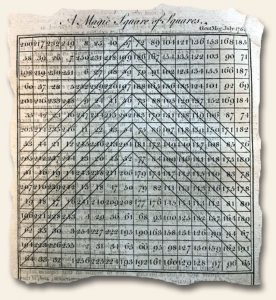 Today’s journey took me to London, England, by the means of The Gentleman’s Magazine of July, 1768. I found an interesting plate entitled “A Magic Square of Squares” with an accompanying article “Surprising Properties of Numbers placed in Dr. Franklin’s Magic Square of Squares”. This is an interesting puzzle by Benjamin Franklin. “The great square is divided into 256 small squares, in which all the numbers from 1 to 256 are placed in 16 columns, which may be taken either horizontally or vertically. The properties are as follows: 1. The sum of the 16 numbers in each column vertical or horizontal, is 2056. 2. Every half column, vertical and horizontal, makes 1028, or half 2056. 3 Half a diagonal ascending, added to half a diagonal descending, makes 2056; taking these half diagonals from the ends of any side of the square to the middle thereof, and so reckoning them either upward or downward; or sidewise from left to right hand, or from right to left…”
Today’s journey took me to London, England, by the means of The Gentleman’s Magazine of July, 1768. I found an interesting plate entitled “A Magic Square of Squares” with an accompanying article “Surprising Properties of Numbers placed in Dr. Franklin’s Magic Square of Squares”. This is an interesting puzzle by Benjamin Franklin. “The great square is divided into 256 small squares, in which all the numbers from 1 to 256 are placed in 16 columns, which may be taken either horizontally or vertically. The properties are as follows: 1. The sum of the 16 numbers in each column vertical or horizontal, is 2056. 2. Every half column, vertical and horizontal, makes 1028, or half 2056. 3 Half a diagonal ascending, added to half a diagonal descending, makes 2056; taking these half diagonals from the ends of any side of the square to the middle thereof, and so reckoning them either upward or downward; or sidewise from left to right hand, or from right to left…”
The information continues with this sounding like a very early Sodoku puzzle!
~The Traveler
Rare Judaica Collectibles Spanning Three Centuries – 1600’s, 1700’s, & 1800’s…
June 27, 2018 by GuyHeilenman · Leave a Comment
Although we rarely use this forum to highlight items being offered for sale – especially when posted as auction items, however all three authentic publications are rather unique and highly desirable:
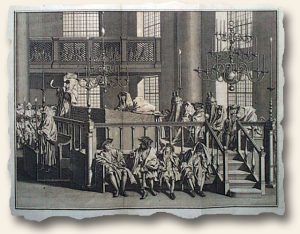 1670 – The Jews Are Banished From Vienna (Austria)
1670 – The Jews Are Banished From Vienna (Austria)
1778 – A Rare Print from the inside of the Synagogue at Amsterdam showing the celebration of Rosh Hashanah – “The Sounding of the Ram’s Horn” (note: we’d love to know which synagogue is shown)
From their ongoing quest to be accepted, to full acceptance demonstrated through their response to tragedy, with a rare, intimate, and illustrated look at one of their holy days sandwiched in-between, this set of issues certainly provides a broad-brush perspective of a people whose mark on history far surpasses their size. While the links above will expire once the auctions have ended, the links below will remain active indefinitely. Enjoy.
- The Jews are banished from Vienna (Austria)… THE LONDON GAZETTE, England, July 28, 1670
- A significant & rare Judaica print… Synagogue at Amsterdam… THE GENTLEMAN’S MAGAZINE, London, May, 1778
- Congregation Shearith Israel mourns… Lincoln’s funeral… NEW YORK TRIBUNE, April 21, 1865
The March (2018) Newsletter from Rare & Early Newspapers…
March 16, 2018 by GuyHeilenman · Leave a Comment
 Each month the staff of Timothy Hughes Rare & Early Newspapers sends out a newsletter to our members which includes special offers, discounts, alerts to new inventory, and information related to the rare newspaper collectible.
Each month the staff of Timothy Hughes Rare & Early Newspapers sends out a newsletter to our members which includes special offers, discounts, alerts to new inventory, and information related to the rare newspaper collectible.
The March, 2018 newsletter:
Welcome to the March edition of our member’s newsletter. This month we have a new set of issues being offered at a discount (50% off), an early look at an extremely rare hand-written Confederate camp newspaper, an offer for a free issue, and links to our most recent posts. Please enjoy.
Thanks for collecting with us.
Sincerely,
Guy & The Rare & Early Newspapers Team
Glorious or sad/bad timing? The death of William Wilberforce… Slavery abolished…
May 25, 2017 by GuyHeilenman · Leave a Comment
 The Gentleman’s Magazine of September, 1773 has a 3+ page obituary of the famed British abolitionist, William Wilberforce. If you are not familiar with this early 18th century member of the British Parliament, you may want to settle in with family and friends and watch the acclaimed movie, Amazing Grace. However, as a primer, feel free to read the complete obituary at: William Wilberforce Death Report. Ironically, you’ll need to scroll past much on the India slave trade in order to view the obituary.
The Gentleman’s Magazine of September, 1773 has a 3+ page obituary of the famed British abolitionist, William Wilberforce. If you are not familiar with this early 18th century member of the British Parliament, you may want to settle in with family and friends and watch the acclaimed movie, Amazing Grace. However, as a primer, feel free to read the complete obituary at: William Wilberforce Death Report. Ironically, you’ll need to scroll past much on the India slave trade in order to view the obituary.
Speaking of irony… The date of his death is sandwiched between the Slavery Abolition Act of 1833’s passage in the House of Commons on July 26, 1833 and its Royal Assent a month later (on August 28th). Whereas the entire obituary can be read through the link above, as of the date of this post, it is also available as an eBay auction at: Wilberforce’s Obit (on eBay).
They put it in print… the Stamp Act…
August 27, 2015 by GuyHeilenman · Leave a Comment
 Some of the most noteworthy events in history have humble beginnings. Such is the case with the announcing of the passage of The Stamp Act in The Gentleman’s Magazine, March, 1765. Under the Historical Chronicle section is the rather inconspicuous note, “Lord Mansfield, as speaker, and the Earls Gower and Marchmont, by virtue of a commission from his majesty, gave the royal assent to the following bills: …for laying a stamp duty in the British colonies in America.” While this official notification of the Stamp Act most likely flew under the radar of most readers of the day, there is no doubt regarding its significance. I wonder which one-liners which go unnoticed today will prove similar ten years from now?
Some of the most noteworthy events in history have humble beginnings. Such is the case with the announcing of the passage of The Stamp Act in The Gentleman’s Magazine, March, 1765. Under the Historical Chronicle section is the rather inconspicuous note, “Lord Mansfield, as speaker, and the Earls Gower and Marchmont, by virtue of a commission from his majesty, gave the royal assent to the following bills: …for laying a stamp duty in the British colonies in America.” While this official notification of the Stamp Act most likely flew under the radar of most readers of the day, there is no doubt regarding its significance. I wonder which one-liners which go unnoticed today will prove similar ten years from now?
The Traveler… Col. Bradstreet’s peace offering… the devil’s what?…
December 1, 2014 by The Traveler · Leave a Comment
Today I traveled to London, England, by the way of The Gentleman’s Magazine of December, 1764. There I found a letter from Quebec reporting “Col. Bradstreet, on his arrival at 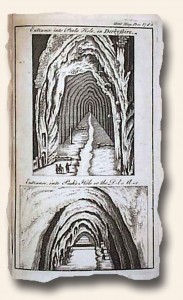 Detroit, sent a belt of peace to General Pontiac, but he, like a true hero, depended on his power, and greatly dared his worst, by cutting the belt in pieces at the head of his army, (the Indians) and two days ago an Indian canoe came on board us, who assured us M. Pontiak had assembled all his forces together at St. Dusky, and received Col. Bradstreet with undaunted courage… “.
Detroit, sent a belt of peace to General Pontiac, but he, like a true hero, depended on his power, and greatly dared his worst, by cutting the belt in pieces at the head of his army, (the Indians) and two days ago an Indian canoe came on board us, who assured us M. Pontiak had assembled all his forces together at St. Dusky, and received Col. Bradstreet with undaunted courage… “.
Also in the issue is a “sketch of Peak’s Hole commonly called the Devil’s A—–se-A-Peak in Derbyshire”. This also is Pool’s Hole and includes a plate with two illustrations. To enter this, “the entrance is by a small arch, so very low, that such a venture into it are forced to creep upon their hands and knees, but it gradually opens into a vault more than a quarter of a mile long, and, as some have pretended, a quarter of a mile high…”. This also has a running stream and both a cold and hot spring — the springs within a hand touch from the other.
~The Traveler
First use of the term “Columbia”…
December 6, 2010 by TimHughes · Leave a Comment
Finding “first” mentions of significant, people, places and terms is always a delight for the rare newspaper collector, and with the internet–and the time required–many fascinating items can be found.
The term “Columbia” as a reference to America, very commonly used through the 19th century in both print & image, was first used in the London publication “Gentleman’s Magazine” in 1738. Because the printing of Parliamentary debates was illegal in England, they appeared under the thinly veiled heading of “Debates in the Senate of Lilliput” or similar heading, with names & places often fictitious or taken from Johnathan Swift’s famous work, which was the literary sensation at that time. The term Columbia was coined by the famed Samuel Johnson, a regular contributor to the “parliamentary” reports found in “The Gentleman’s Magazine“.
In the June issue of 1738, the debates from Parliament note: “…It is observable that their conquests and acquisitions in Columbia (which is the Lilliputian name for the country that answers our America,) have very little contributed to the power of those nations…”.
A significant “first use” of a very popular poetic name for the United States of America.
Quotes defining history…
July 13, 2009 by Morris Brill · 2 Comments
When I was fourteen years old (ah, so many years ago) I acquired an interest in quotations. By the time I was twenty-one I had read the entire collection of Bartlett’s Famous Quotations and recorded each of the quotes that had significance for me. I have since added to my list of favorites.
Coincidentally, when I was twenty-one, I also bought my first collectable newspaper; The Assassination of President John F. Kennedy.
Many years ago I concluded that often a quote, paired with a specific headline, added profound meaning to the headline. The right quotation enhanced the moral or social significance of the headline. Often, the right quote was able to capture the ‘essence’ of the headline.
Quotes, like newspapers, unite us with the past. They provide us with the thoughts of those who came before us. Additionally, within a newspaper, you may find text that contains a statement that later becomes a famous quote.
For instance: the Boston Gazette of December 26, 1805 contains a report on the Battle of Trafalgar. The article quotes British Admiral Horatio Nelson as saying, “England expects that every man will do his duty.” And we all know of President Franklin Roosevelt’s quote in his inaugural acceptance speech in 1933, “There is nothing to fear but fear itself,” which can be found on the front page of many newspapers of the time.
Of course, each individual would select different quotes to pair with a headline. I believe that the quotes a person prefers are a reflection of that person’s personal social background, religious background, education, and political persuasion.
With that said, and with your indulgence, I would like to share with you a very small sample of my pairings.
Headline: Treaty of Peace – Pennsylvania Packet – 11/08/1783
Quote: “What a free society offers to the individual is much more than what he would be able to do if only he were free.” – F.S. Hayek
Headline: Death of Benjamin Franklin – The Gentleman’s Magazine – 06/01/1790
Quote: “It is sweet to serve one’s country by deeds, and it is not absurd to serve her by words” – Sallust
Headline: Death of President Washington – The True American – 01/01/1800
Quote: “A patriot must always be ready to defend his country against his government” – Edward Abbey
Headline: Queen Victoria Coronation – Main Farmer/Journal of Useful Arts – 08/07/1838
Quote: “Uneasy is the head that wears a crown” – William Shakespeare
Headline: This “Flying Machine” Flies – Philadelphia Press – 12/19/1903
Quote: “I think for months and years. Ninety-nine times, the conclusion is false. The hundredth time I am right” – Albert Einstein
Headline: Life Terms in Prison for Leopold and Lobe – Los Angeles Evening Herald – 02/04/1924
Quote: “Being brilliant is no great feat if you respect nothing” – Johann Wolfgang von Goethe
Headline: Death Takes Stalin’s Reign – Syracuse Herald-Journal – 06/06/1954
Quote: “O, it is excellent to have a giant’s strength! But it is tyrannous to use it like a giant.” – William Shakespeare
Headline: Eichmann Convicted – Los Angeles Mirror – 12/11/1961
Quote: “The belief in a supernatural source of evil is not necessary; men alone are quite capable of every wickedness.” – Joseph Conrad
Headline: A Lonely Life Ends on Elvis Presley Boulevard – Memphis Press Scimtar – 08/17/1977
Quote: “It is loneliness that makes the loudest noise. This is true of men as of dogs.” – Eric Hoffer
Thank you for attention and interest.
Morris Brill
Editorial policy (?) and the potential impact upon an issue’s collectibility…
April 11, 2009 by GuyHeilenman · Leave a Comment
The following are a few thoughts by Morris Brill (guest contributor) concerning slight differences in the printing of the Declaration of Independence within the London Chronicle (dated August 17, 1776) vs. the printing within the Gentleman’s Magazine (dated August, 1776):
Recently on Ebay two different sellers offered a printing of the Declaration of Independence in the Gentleman’s Magazine. I also noted your offering of the Declaration within the London Chronicle.
I (Morris) noted, while reading the text of Gentleman’s Magazine, as photographed on Ebay, a particular sentence in which two words were missing and substituted with a line, i.e. ___________
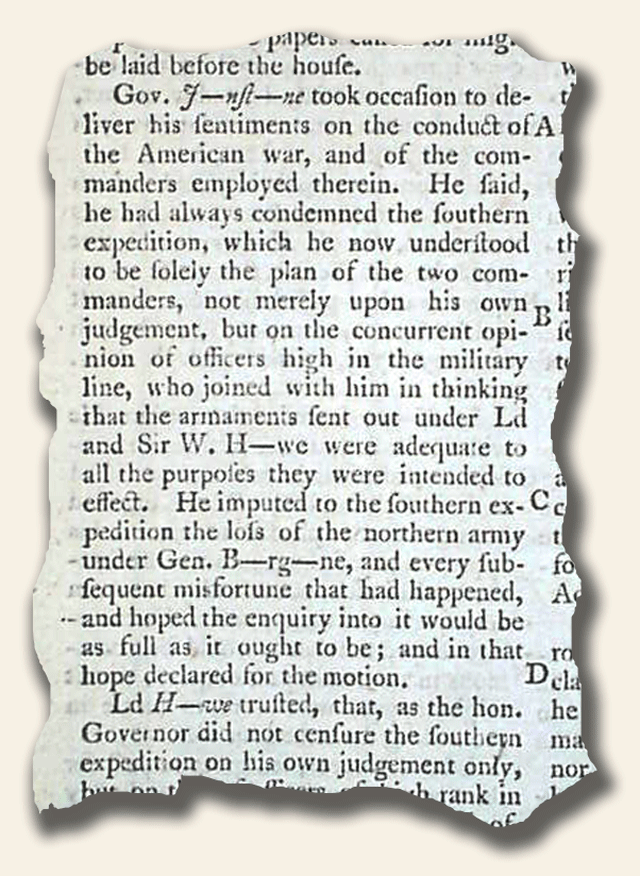 The sentence is as follows:
The sentence is as follows:
“A prince, whose character is thus marked by every act which may define a tyrant, is unfit to be the ruler of a free people.”
In the Gentleman’s Magazine the words ” prince” and “tyrant” are deleted.
I find it interesting that although the Gentleman’s Magazine and the the London Chronicle are both British that one paper printed the words prince and tyrant, yet the other did not.
To me, the deletion of the two words certainly diminishes the historic value of the printing as it appeared in the Gentleman’s Magazine, although I would not pass up the opportunity to own this paper. Perhaps it has to do with an opposing editorial policy, or the political persuasion of the two publishers.
Morris
Note: If anyone is aware of the formal policy which led to the deletion of certain words within the Gentleman’s Magazine, please share your insight with the rare newspaper community.



